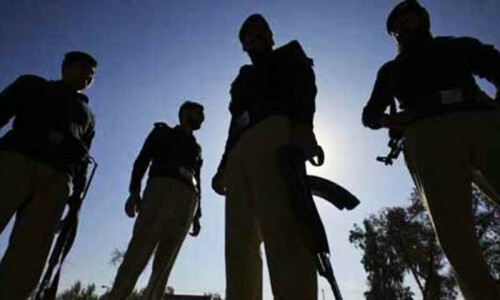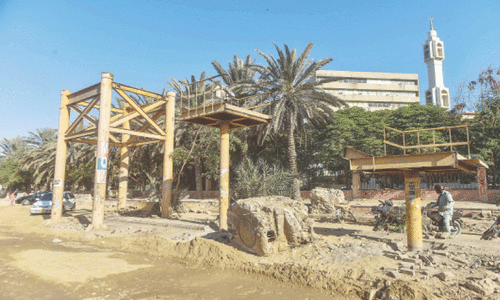IT has not taken much time for the tenuous unity that emerged after the Peshawar school carnage to crumble. Once again, there is an attempt by members of the religious right to turn the narrative to protect their militant enterprise. No sooner had public outrage over the tragedy begun to subside than they were back to their old tricks. ‘Islam under threat’ is a convenient mantra to shield radical clerics and their seminaries closely linked with banned militant outfits.
It did not come as a surprise when both the JUI-F and Jamaat-i-Islami reneged on their endorsement of the 20-point national counterterrorism action plan and abstained from voting on the constitutional amendment empowering military courts to try hardened militants. They now smell a conspiracy to ‘secularise’ the country. What changed their minds is not difficult to comprehend.
These two largest Islamic parties are the original faces of jihadi politics in the country. Many of those fighting the Pakistani state with militant groups have originated from their ranks. So, their worries over a potential crackdown on radical seminaries and militant groups are not a total surprise.
One of the objections of the religious parties is the clause in the amendment related to the use of religion or sect for acts of terrorism tried under the military courts. They described the wording as discriminatory against religious groups and seminaries. Nothing can be more absurd than this argument of the selective targeting of Islamic groups. The lady doth protest too much.
It is a fact that most terrorist attacks and sectarian killings in Pakistan are religiously motivated. The Taliban and other militant groups justify their terrorist actions in the name of ‘Sharia and Islam’. The latest example of this was the statement by the Tehreek-i-Taliban Pakistan spokesman claiming responsibility for the school carnage. A hadith was cited in support of the heinous crime.
Militancy and extremism cannot be dealt with without eradicating their ideological sources.
Had not radical clerics such as Maulana Abdul Aziz of Lal Masjid issued fatwas justifying insurgent attacks on Pakistani security forces? Didn’t the Taliban led by Mullah Fazlullah kill hundreds of people in Swat in the name of the ‘Islamic Sharia’? Whether it is the massacre of Hazara Shias or attacks on mosques, shrines and churches — all have been carried out in the name of religion.
Suicide bombers are brainwashed and motivated by the false interpretation of religion. Poverty, unemployment, romantic notions of jihad and the growing influence of radical Islamist groups have been the main reasons driving a young man to become a suicide bomber. The pulpit of the mosque is used by clerics to spread sectarian hatred and incite violence. The trail of international terror has often led to madressahs and mosques in Pakistan.
Even scholars of Islam and moderate clerics have not been spared for speaking out against terrorism. The scourge of terrorism and violent extremism cannot be effectively dealt with without eradicating their ideological sources. Surely it will not be easy. The proposal for madressah reform faces the greatest resistance not only from the mainstream Islamic parties, but also other vested interests.
It is true that madressahs are not the sole source of militancy and religious extremism in the country, but they certainly are the main source. It is estimated that only 10-15pc of madressahs are involved in radical activities. That too is a very large proportion, given the mushroom growth of unregistered and unregulated madressahs.
The proliferation of jihadist and sectarian organisations in Pakistan had been the result of a militant culture espoused by radical madressahs long patronised by the Pakistani state and funded by foreign money. They have turned into hubs of religious extremism having had a spill-over effect, and now present a serious threat to Pakistan’s internal security.
Saudi Arabian patronage, especially of more radical seminaries, has played a major role in the spread of sectarian hatred. Successive governments ignored their activities out of political expediency and also because most of the foreigners supporting them were ‘brotherly’ Muslim countries.
Religious sectarianism, the principal source of terrorist activity in Pakistan, presents the most serious threat to the country’s internal security. Sectarian militancy has been deeply intertwined with the radicalisation of the madressah, as minority sects feel increasingly threatened.
Divided along sectarian and political lines, religious seminaries are largely controlled by the two main branches of Sunni Islam — the Deobandi and the Barelvi. Ahle Hadith or Wahabi Muslims have their own schools, as do the Shias. Most of the madressahs are in time zones centuries away from the outside world.
Teaching is rudimentary and students are taught religion within a highly rigorous and traditional perspective, giving them a deeply retrograde worldview. The most dangerous consequence of the content and style of teaching in religious schools is that the people emerging from them can do nothing other than guide the faithful in rituals that, in fact, demand no experts. The education imparted by traditional madressahs often spawns factional, religious and cultural conflict. It creates barriers to modern knowledge, stifles creativity and breeds bigotry, thus laying the foundation on which fundamentalism — militant or otherwise — is based.
Divided by sectarian identities, these institutions are, by their very nature, driven by their zeal to outnumber and dominate rival sects. Promoting a particular sect inevitably implies the rejection of other sects, sowing the seeds of extremism in the minds of the pupils. The literature produced by their parent religious organisations is aimed at proving the rival sects infidels and apostates. The efforts by successive governments to modernise madressah curricula and introduce secular subjects have failed because of the stiff resistance put up by religious organisations controlling the religious schools.
It is now a test of the government’s resolve whether or not it submits to the blackmailing of these religious parties. Any modification in the action plan to appease the religious right will defeat the entire counterterrorism effort. The exploitation of religion has to be stopped if we are really serious about rooting out the extremism and militancy present in our society.
The writer is an author and journalist.
Published in Dawn January 14th , 2015
On a mobile phone? Get the Dawn Mobile App: Apple Store | Google Play













































